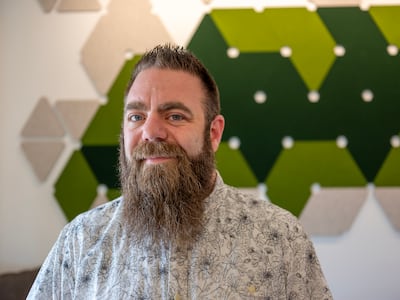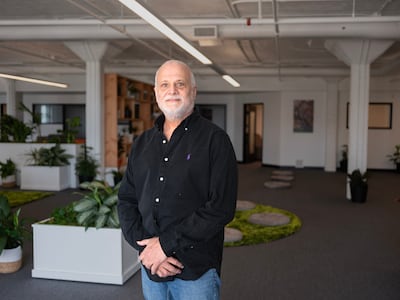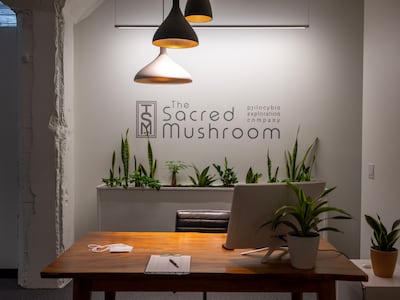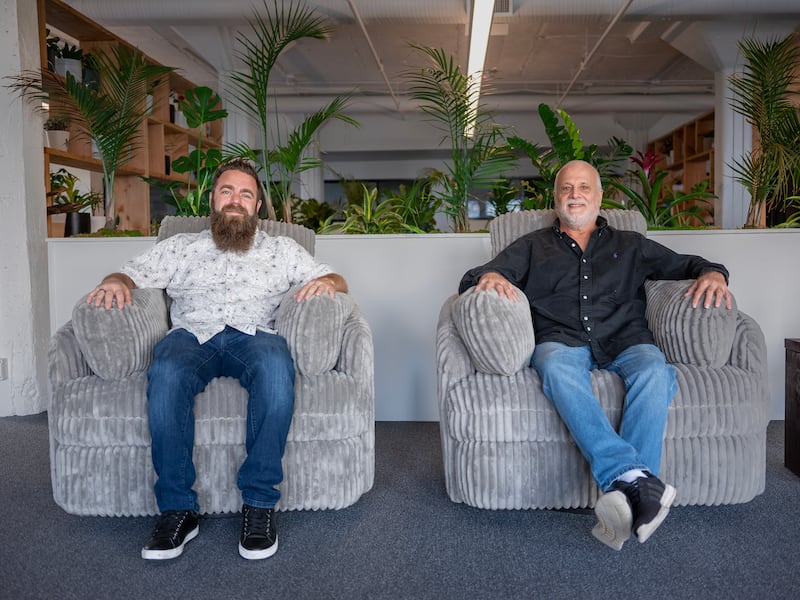Bryan Arnold stands in plush carpet on the seventh floor of an Old Town office tower, looking out at the view his clients will see when they trip on magic mushrooms: downtown, Big Pink, the Willamette River and, in the distance, the crags of Mount Hood.
Arnold, an amiable man with a long beard, is the chief facilitator at The Sacred Mushroom, Oregon’s newest “service center,” where people can take psilocybin, the active compound in psychedelic mushrooms, guided by practitioners like him.
The U.S. Drug Enforcement Administration considers psilocybin dangerous and medically useless, but another wing of the federal government, the Food and Drug Administration, calls psilocybin a “breakthrough treatment” for depression. Clinical research at Johns Hopkins and other top-flight universities shows that just a single dose of psilocybin—coupled with therapy—can lift treatment-resistant depression, dislodge stubborn trauma, and ease crippling anxiety.
Oregon set the world abuzz in 2020, when voters approved Measure 109, making mushroom trips legal in highly regulated settings under the watchful eye of accredited guides. Since June 2023, when the system got up and running, more than 5,000 people have donned eye masks and headphones to journey inward and meet their demons.
Many of the new psychonauts are from other states. One North Carolina man endured post-traumatic stress for decades after a horrific car accident. Years of therapy offered little relief. During a trip in Ashland last year, he relived the crash again, but this time the car sprouted wings and flew safely away. His trauma evaporated.
“I haven’t felt a lick of it since,” he tells WW.
So far, about 30 mushroom service centers have cropped up in Oregon to offer encounters with psychedelia. Most are mom-and-pop shops, and many are struggling to make money under the state’s restrictive legal regime.
The Sacred Mushroom is, by contrast, going big. It may be the largest center in the state. It’s a breed apart in other ways, too. Advocates for Measure 109 said legalizing mushrooms would ease suffering. Their pitch was therapeutic. Arnold and his partners agree, but they also aim to attract trippers looking for some fun. They’re pitching their space for corporate retreats, Halloween, even the Super Bowl.
The Sacred Mushroom arrives at a critical juncture in Oregon’s experiment with psychedelics. Going first comes with risks, and there are plenty right now. Few, if any, service centers are making money because it costs so much to outfit them with required equipment like security cameras and heavy safes (to store Schedule I drugs). Many facilitators are guiding underground in their homes and in Airbnbs, where overhead is far lower. Plus, it’s easier and cheaper to grow mushrooms than cannabis.

Arnold and his partners are betting that spa-like amenities and their pitch to party seekers will command a premium, putting them in the black while others bleed red ink. Arnold says he’s still working out pricing, but he expects a full trip will cost between $1,200 and $1,400 per person, in line with other centers.
Which brings up something else that’s unusual about The Sacred Mushroom: It claims to be the first publicly owned service center in the U.S., with penny-priced stock that investors can buy if they’d like to cash in on the shroom boom.
That gives pause to critics like Noah Heller, who started a company that makes software for ketamine clinics. Psychedelics helped him beat back terrible depression, but Heller is wary of how Oregon is handling the shroom business. Regulations make costs too high for anyone to make money, he says, but that won’t stop the hucksters.
“Psychedelics are disproportionately affected by gold rush economics,” he says.
Arnold is the public face of The Sacred Mushroom. Oregon law requires that service centers be owned by state residents, and Arnold, who has lived in Portland for 20 years, qualifies. But filings with the U.S. Securities and Exchange Commission show who’s really in charge: Kaya Holdings Inc., a Fort Lauderdale, Fla., cannabis company with shaky financials and a key player with a checkered past.
Kaya’s top executive is Craig Frank, a slight man with a New York accent who grows animated when talking about psilocybin. He’s the company’s chairman and the largest investor, with a 25.7% interest, according to SEC filings. He spent much of his life as a business adviser in Israel and Central America and now lives in Fort Lauderdale. He has yet to trip on shrooms, but he’s well versed on the research.
“It is a mind-opening journey,” he says.”And I don’t know anybody, certainly not myself, who couldn’t benefit from some opening of the mind.”

Frank, 64, says he took the reins of the company that would become Kaya Holdings in 2006. In 2010, the firm—then called Alternative Fuels America—tried making biodiesel from the Costa Rican jatropha tree, then thought to be a wonder crop. When Oregon legalized cannabis for recreational use in 2014, Frank pivoted. He changed the name of the company to Kaya, a Jamaican slang term for weed.
Cannabis was a ripe market for stock schemes back then, says Vince Sliwoski, a Portland lawyer who advises cannabis and psilocybin firms. It was the “green wave,” and Oregon was the first jurisdiction in the world to allow outside investment in the cannabis industry. Dispensaries sprouted throughout the state. So did fraud.
“There was such a huge influx of that stuff in Oregon,” Sliwoski says.
Companies with stocks that sold for pennies set up large grow operations and put out press releases making claims that drove their stock price higher, only to have it crash when profits failed to follow the hype. But, by that time, their biggest stockholders had already cashed out, leaving small investors stuck with worthless shares.
“A lot of people lost a lot of money,” Sliwoski says.
There’s no evidence that Kaya participated in stock fraud, but it had other legal troubles. At its apex, Kaya ran four dispensaries, a 26-acre farm in the Willamette Valley, and a grow operation in Eugene. Kaya shares traded at $6 in January 2017, when cannabis was white hot and pot stocks soared. But supply more than met demand, and the industry crashed. Kaya shares plummeted to 3 cents in 2021.

A run-in with the Oregon Liquor and Cannabis Commission hastened Kaya’s exit from the state’s weed market. In 2022, investigators concluded that employees at Kaya’s Salem dispensary “more likely than not” sold pre-rolled joints tainted by broken glass.
Investigators also found that Frank and a Kaya adviser “intentionally asked or encouraged employees to conceal potential evidence of violations…by telling them not to ever speak directly to the OLCC and/or by threatening employees with termination or lawsuits if they were to report issues of concern to the OLCC.” Kaya settled with the agency without admitting guilt for the broken glass and sold its Salem dispensary.
The whole ordeal stemmed from “an absurd accusation made by a discontented employee,” Frank tells WW. Nor did the OLCC let Kaya explain itself, he says.
Frank pivoted again, this time to psilocybin, when Oregonians passed Measure 109. Kaya sold its U.S. cannabis assets and began developing The Sacred Mushroom. It issued press releases describing a company on the verge of transformation. The releases remind readers of Kaya’s stock symbol—KAYS—in the first sentence.
“While there is more to do,” to make The Sacred Mushroom a success, Kaya said in a July press release, “we are proud to be in the forefront of an industry that is poised to offer relief to so many, as well as growth opportunities for KAYS.”
So far, the pivot hasn’t paid. Kaya lost almost $750,000 in the six months ended June 30, according to its latest quarterly report, and its liabilities exceed its assets by more than $16 million. The bulk of its liabilities is debt that the company can convert to shares, Frank says, “a very manageable load for a facility like The Sacred Mushroom.”
The stock changes hands at 4 cents a share.
“It’s a zombie kind of company from a financial perspective,” Sliwoski says.
Like many experts, Sliwoski is wary of firms with shares that trade on over the counter exchanges, where penny stocks dwell. Regulators consider these exchanges treacherous, too. OTC stocks can be risky for unwitting investors, the SEC says, because they’re prone to price swings and manipulation by fraudsters.
“I wouldn’t touch any OTC company with a 10-foot pole,” Sliwoski says.
The SEC warns investors to be wary of small companies that promote their stock with a blizzard of press releases and posts on message boards. Such companies tend to switch industries when one fizzles and another gets hot.
Kaya Holdings isn’t promoting its stock, Frank insists.
“We’re not going to engage in trying to promote the stock until we’re confident we have something that will bring value to the stockholders,” Frank says.”Just because you have the capacity doesn’t mean you have the will.”

To its credit, The Sacred Mushroom has created an alluring space. In one corner, a canvas and paintbrush lie in wait. There are yoga mats, singing bowls, and massage chairs looking south to Big Pink. Palms tower from a wooden shelf. Doors open to private rooms with reclining beds and weighted blankets, decked out with sound systems, projectors and essential oils for those journeying inward.
Variety is a big part of The Sacred Mushroom’s pitch. Hence the Halloween parties.
“It’s not just for people seeking therapeutic relief or treating something,” Arnold says. “It can be just for people who are curious, who want to explore themselves.”
That’s how Arnold, then in his 20s, discovered shrooms. A transplant to Portland from Walla Walla, Wash., he spent a day with a friend at Hug Point on the Oregon Coast. With no other souls in sight, the pair explored pioneer-era wagon ruts and ducked into caves carved by the Pacific. As the drug took effect, the cove’s sandstone walls transformed to a Mount Rushmore-like carving of Indigenous faces peering out to sea.

He learned “ineffable” things, Arnold says. “It was the most awakening, most incredible day in my life, up until I saw my daughter born,” he says.
That encounter and others that followed inspired Arnold to get in on the ground floor of Oregon’s psilocybin economy. He was one of the first in the state to graduate from a psilocybin facilitator training program—Portland’s Changa Institute—last year.
Willy Thomas, who runs the mushroom center Tripz Oregon in the back of his head shop in Newport, completed the course at Changa alongside Arnold.
“He’s a great guy,” Thomas says. “I’m excited for their space.”
In addition to Arnold, the local owner, and Frank, the chairman, The Sacred Mushroom has a third creator who isn’t in the org chart: W. David Jones, Kaya’s senior adviser for business development, licensing and financial operations. Jones lives in Boca Raton, Fla. SEC filings show that Jones’ contract has paid him $25,000 a month as a consultant to Kaya, but Frank says his actual pay is now less. Jones joined Kaya Holdings in 2013, to promote its biofuels business through a newsletter he ran, in exchange for cash and stock.
By then, records show, he already had a long history of fraud.
Jones, 63, got his start as a securities broker in the 1980s and later moved into stock promotion. He made $4.5 million promoting gold mines in Nevada and California, according to records in Nevada federal court. In 1998, he was convicted of securities fraud for selling millions of shares to “unsuspecting investors,” SEC documents show.
“Despite its inability to establish its mining business, the company had great success marketing its stock,” an administrative law judge wrote then.
Jones ran into more trouble in 2002, when the SEC found he had violated securities laws and ordered that he repay about $2 million.
To reduce his penalty, Jones struck a deal with the feds and helped with “Operation Bermuda Short,” a sting aimed at stock fraudsters in Boca Raton, long a haven for financial scammers. The operation produced 44 convictions. Federal prosecutors cut Jones’ prison sentence from five years to 12 months.
“David Jones was obviously someone who was very culpable at that time in setting up the scheme that he was charged in,” says Brenda Hamilton, a Florida securities lawyer. “And he received a slap on the wrist.”
Jones and Frank maintain he learned from his mistakes. Jones discloses his history “to anyone I do business with,” he says. “I was a stock promoter in the late ‘90s in South Florida. I made some mistakes, accepted responsibility, started over—a little bit more carefully, a little bit more thoughtfully.”

Jones is often quoted in Kaya’s press releases, though the disclaimers at the bottom don’t detail his past. Jones says he has played a key role in Kaya’s business. He introduced Frank to CVC International, he says, a Cayman Islands venture capital firm that has bankrolled 95% of Kaya’s business activity over the past decade, by Jones’ estimate.
More recently, Jones says he negotiated The Sacred Mushroom’s Old Town lease with landlord Brian Wannamaker, an art financier and real estate investor (see sidebar). Jones also navigated Oregon Health Authority regulations to win The Sacred Mushroom’s service center license, documents obtained by a public records request show.
Jones says his record didn’t raise any red flags with OHA.
“They made the process very approachable,” he says.
Angela Allbee, chief of OHA’s psilocybin division, says Jones cleared a criminal background check alongside his colleagues at Kaya. All mushroom center operators are fingerprinted and investigated by state officials outside of OHA. A felony conviction doesn’t necessarily disqualify an applicant, Allbee says. If Jones disclosed his record to investigators, OHA wouldn’t know. It only gets notified of the result.
“We do a really thorough job during the licensing process,” Allbee tells WW.
Nor does Jones’ past trouble Arnold, who will run Kaya’s operation.
“It’s not really my business,” he says. “He paid his dues, and it was a long time ago.”
Kaya isn’t the first penny stock company to pivot from cannabis to psilocybin.
The pandemic years were a heyday for psychedelics stocks. Fueled by Oregon’s legalization in 2020 and Michael Pollan’s blockbuster book How to Change Your Mind, shrooms were all the rage. Small, public companies sprang up on U.S. and Canadian exchanges with claims of revolutionizing mental health treatment.
Those plans didn’t always work out.

In 2021, the Canadian cannabis firm Halo Collective partnered with the Dutch psilocybin retreat firm Red Light Holland to set up psilocybin operations in Oregon. Red Light Holland’s stock soared on claims that microdosing in Oregon would become a $1 billion industry. The shares collapsed when microdosing brought micro profit.
It’s been tough sledding since. One mushroom center, The Journey in Portland, which was less than half the size of The Sacred Mushroom, has already closed, hurt by high costs and a robust black market. Another, Inner Guidance in Albany, had to fundraise on social media to keep its doors open, the Albany Democrat-Herald reported.
“Nobody’s getting rich here,” says Heidi Venture, who co-founded a mushroom center in Hood River. “These nice people at The Sacred Mushroom, I don’t think they’re going to get rich either.”
Frank balks at such concerns. Unlike other psilocybin stock ventures, The Sacred Mushroom is putting down deep roots in Oregon, he says. Meanwhile, he’s eyeing an expansion to Colorado, which legalized psilocybin and other psychedelics in 2022.
“If anybody has a shot at succeeding here,” Frank says, “I think it’s us.”

Brian Wannamaker
Kaya Holdings has at least one new stockholder: its landlord.
Portland real estate mogul and art financier Brian Wannamaker, best known for developing North Mississippi Avenue, owns the historic Falcon Building in Old Town. He leased its top floor to The Sacred Mushroom at a “substantial discount” in exchange for stock. He won’t say how much.
“All that stuff is sort of private,” Wannamaker tells WW. “But I like doing creative deals like that with good, potential companies.”
Wannamaker says he gave The Sacred Mushroom time to get situated before its lease began, too. The stock trade was Wannamaker’s idea, says W. David Jones, Kaya’s senior adviser for business development, licensing and financial operations.
Located at the west end of the Steel Bridge in Old Town, the Falcon was built in 1926 and remodeled in 2014, the year Wannamaker bought it. Today, about 60 clothing designers, painters and other artists work there.
The real estate market in downtown Portland has been rugged since COVID-19 reared its head, Wannamaker says. The web design company that occupied The Sacred Mushroom’s space began operating remotely during the pandemic.
Old Town could be jarring to people coming off mushroom trips. The Falcon stands at ground zero for unsheltered homelessness and addiction. Blanchet House, a homeless services provider for some of Portland’s highest-need residents, is across the street.
In late July, a few tents lined the streets surrounding the Falcon. A woman exited one of them and hung blankets to dry on a chain-link fence after an unseasonable rain. Another person paced the sidewalk and screamed.
Arnold says he has empathy for unhoused people and knew that Old Town was “rough around the edges” when Kaya Holdings set up shop. He has a plan, though. He’ll let customers into the building immediately so they don’t have to linger on the sidewalk before their shroom trip.
Correction: This story initially stated that Craig Frank founded the company that would become Kaya Holdings in 1993. Frank says he took control of the company in 2006. WW regrets the error.

